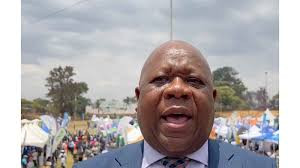
Science and Advanced Global Innovation Technologies (SAGIT) in partnership with the Ministry of Higher and Tertiary Education Innovation Science and Technology development is the Atlas Convention 2021 under the theme Igniting Infinite Possibilities.
Set to be Zimbabwe’s biggest Innovation, Science and Technology Convention. The Atlas Convention is an integrated national-innovation technology symposium to be held annually to actively converge experts from all economic sectors on sustainable development, innovation-driven and private sector-led economic transformation through initiatives benchmarked to national, continental and global economies. This year’s Theme is Igniting Infinite Possibilities and registration is in progress on the event platform www.atlasconvention.com.
Hosted on the world’s biggest online artificial intelligence driven business community with +55 million annual traffic of business event-goers, +5.2 million subscribed business, tracking +30 000 global business events at any instance and where every minute, 570 people are creating or getting a business opportunity.
The Atlas convention come at a point in time where as a nation we need more strategic efficient and safe ways to do business in the new normal with exposing our people to the pandemic that Zimbabwe has managed to keep
Keynote speakers are drawn from the national, regional/continental and global context
- National: Honourable Minister Professor Amon Murwira
- Continental: Smart Africa Director General Mr Lacina Kone
- Global United: Nations SDGS Ms Maria
- Hon Amon Murwira National, NDS1 and Agenda 2030
His remarks as the Patron of the Atlas Convention at the official launch of the Atlas Convention showed how the Atlas convention is a very strategic platform to bridge the industry and Academia as well as act as a spring board for economic transformation at both continental and global level.
The Atlas Convention; an integrated technology and economic transformation initiative, which is set to transform the innovation agenda in Zimbabwe. The convention brings together government, private sector and the academia as it seeks to further open up and enhance the innovation space by driving economic development through innovation. This will also assist Zimbabwe in the attainment of Vision 2030 “Zimbabwe becoming and upper an upper middle-income economy”.
The rapidly ever-changing business environment calls for the formulation of innovative multi pipeline and bridging concepts with a global perspective. In our country the call for innovation has never been more intense. Undoubtedly innovation plays a key role in driving sustainable development, spurring growth of organisations and economies by unlocking latent market value.
- Chamisa under fire over US$120K donation
- Mavhunga puts DeMbare into Chibuku quarterfinals
- Pension funds bet on Cabora Bassa oilfields
- Councils defy govt fire tender directive
Keep Reading
The Atlas Convention will bridge the gap between academia and industry, setting the stage for the establishment of a broad-based economy with a more diverse industry and export portfolio. Our aim is to convert innovation potential to commercial products and services which will steer economic growth hence the theme for the Convention is “IGNITING INFINITE POSSIBILITIES”
Our country has a huge store of innovative talent with great potential to provide solutions to the country’s most pressing problems. The aim of the Convention is to showcase to industry some of the prototypes that have been developed and enable partnerships that will bring solutions to the problems faced by industry. Academia will be able to explore their technology talent while solving real life and industry-based challenges.
Through this initiative we urge the private sector to seek collaborative synergies to “MAKE YOUR BRAND RELEVANT TO A YOUNGER AUDIENCE”. Advanced subjects like Artificial intelligence can be rooted and conceptualised in the academia through research and development that is industry oriented. Artificial Intelligence (AI) is already playing an increasing role in many existing and evolving technologies that can help us advance more rapidly towards the achievement of the SDGs and Vision 2030. It is our responsibility to utilise initiatives like the Atlas Convention and Innovation Challenge examined ways to use Artificial Intelligence (AI) to catalyse development in Africa. To reduce the current gap between developed and developing countries. AI can help with some of the region’s most pervasive problems: from allowing faster knowledge sharing and improving education, to enabling more accurate forecasting, delivering healthcare and eradicating diseases.
AI will also generate new, high-value jobs requiring technical skills, such as network engineers in the banking sector or web programmers in the retail industry. Demand for data scientists, robotics experts, and AI engineers will increase significantly.
In line with the country’s Open to Business policy, Government is keen on Public Private Partnerships that will enhance innovation and drive economic development. This move by the Ministry of Higher and Tertiary Education Innovation Science and Technology Development and Science and Advanced Global Innovation Technologies (SAGIT) is an example of such PPPs. To this end there has also been collaboration between this convention and the Emirates foundation through affiliation to the Think Science World Fair to expose local innovation talent to global platforms for Innovation Science and technology. This will help enhance transforming and path breaking initiatives that will meet specific economic needs.
- Continental Smart Africa and Lacina Kone
Mr Lacina Kone’ the Director General of Smart Africa will deliver a keynote speech on economic transformation at continental level and context in line with the vision of Smart Africa to Transforming Africa into a single digital market. The Keynote speech will be followed by interactive high level plenary sessions to discuss the immense potential and opportunities Africa has as it drive towards creating Single digital economy.
SMART Africa is a bold and innovative commitment from African Heads of State and Government to accelerate sustainable socio-economic development on the continent, ushering Africa into a knowledge economy through affordable access to Broadband and usage of Information and Communications Technologies.
The Transform Africa Summit held in Kigali, Rwanda on 28th-31st October 2013 culminated in the adoption of the Smart Africa Manifesto document by seven (7) African Heads of States (Rwanda, Kenya, Uganda, South Sudan, Mali, Gabon, Burkina Faso) in which they committed to provide leadership in accelerating socio-economic development through ICT’s.
On 30th-31st January 2014, The SMART Africa Manifesto was endorsed by all Heads of State and Government of the African Union at the 22nd Ordinary Session of the Assembly of the African Union in Addis Ababa. This development places the Manifesto at the heart of the ICT agenda in Africa beyond just the 7 original signatories at the Summit to all the 53 African countries.
The Smart Africa Alliance has since grown to include 31 African countries that represent 700+ million people. The development places ICT at the heart of the ICT agenda in Africa beyond the original. Investment in ICTs is essential in taking any country to the next level of productivity and efficiency. It is not at the expense of other sectors, investing in ICTs results in benefits for every sector and the earlier you start the better.
The Atlas Convention is a Strategic convention that draws experts from across the globe and will essentially act as one strategic platform that fosters the visions of Smart Africa to Transforming Africa into a single digital market.
- Global Context and Sustainable Development
United Nations (UN) Resident Coordinator for Zimbabwe, Ms. Maria Ribeiro will deliver a keynote Speech on Sustainable development in the global context following her Remarks at the launch of Atlas Convention 2020 held on 31 October 2019 at Harare International Conference Centre.
She shared the UN perspective on efforts to bridge the academia system with industry/business for sustainable development and economic growth. The Atlas Convention will also engage young people to unleash their innovation prowess to contribute to the economic emancipation of Zimbabwe’s youthful economy. Her remarks included a wider global perspective including:
- Harnessing Zimbabwe’s rich natural resources for sustainable development and inclusive growth.
- Optimal use of human capital for sustainable development. Zimbabwe has high level of human capital, but quality is deteriorating and not effectively utilized.
- Investments in health for sustainable human capital and service delivery
- Addressing food security and lingering challenges of natural disasters and economic shocks
- Unlocking the engagement of private sector for sustainable economic growth
- all hands-on deck to achieving the Sustainable Development Goals including when responding to humanitarian response (humanitarian-development- peace nexus)
Zimbabwe has some of the richest and most diversified natural resource bases, especially minerals ranging from gold, platinum, diamonds, coal, chrome and nickel to name a few among over 60 economic minerals proven to be commercially viable as well as fertile land with great potential for increasing agricultural production. In this regard, Zimbabwe needs long-term strategies to develop the sectors for the benefit of the average people including through value addition and generating revenue. The higher learning institutions could engage students and faculties to explore innovative and sustainable way of harnessing these natural resources. Zimbabwe’s natural beauty is not fully harnessed to its potential due to low investments, limited outreach and negative narrative. Tourism sector could not only provide jobs but also generate revenue if standards are maintained, infrastructure is developed, visa processing is expedited, and messages are taken to outside world. This is another area that the higher learning institutions can inform policies through research, regular comparative and trend analysis.
Zimbabwe has high level of human capital, but quality is deteriorating and not effectively utilized. Zimbabwe has a high level of human capital, as measured by the adult literacy rate. Adult literacy rate at 88.7% in 2016 is far ahead of Sub-Saharan African average of 59.9% and comparable to those in upper middle-income countries. However, the quality of human capital stock has shown some deterioration but most unfortunately not well utilized for development. Zimbabwe also has highly vulnerable employment level of 65.7%. This would imply that Zimbabwe’s human capital is not effectively utilized for its development. While this has direct links to the prevailing economic conditions, and primarily require putting in place conditions for the economy to grow and provide employment opportunities, equally important is to promote decent employment. Going green by adopting green technology can be the new and inclusive economy nudging Zimbabwe to leapfrog and achieve transformative growth to achieve Vision 2030.
Private sector usually plays the anchor role in economic development. However, that role in Zimbabwe is constrained due to prevailing economic conditions. The engagement of private sector would also help reduce the pressure on the budget as some activities could be undertaken by business. In this regard, the government could undertake include, among others: Reduce infrastructure gap, especially in ensuring regular and un-interrupted energy supply. Undertake structural reforms, including public financial management, institutional efficiency, property rights and reducing discretion and uncertainty in implementing policies, rules and regulations.
The uncertain economic climate and climatic shocks are likely to adversely affect many aspects of SDGs including livelihoods, especially of the poor, and domestic investments. The budgetary constraints also restrict the government in investments in reviving the economy and social services delivery with threats to achieving Sustainable Development Goals. It is therefore, imperative to expedite the ongoing reform measures, including fiscal consolidation, creating an investor friendly Zimbabwe including through ease of doing business, arrears clearance, and strengthening transparency and accountability in public affairs and natural resource management, among others. Aligning policies and strategies under these initiatives to achieve SDGs would be vital to reach the goal posts by 2030. Such reforms and an inclusive approach that include: gender equality, human rights, climate-smart and results based would garner financial support from external stakeholders while the government taking the lead in widening the fiscal space for public investments and creating a robust financial system to cater to domestic financing needs.








